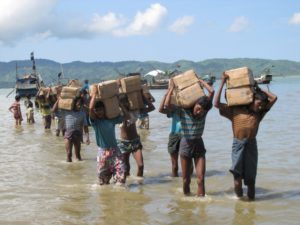UN Launches Investigation into Myanmar Crackdown on Rohingya Minority
 The United Nations Office of the High Commissioner of Human Rights (OHCHR) mandated a probe into the recent crackdown on the Rohingya minority in Myanmar on Tuesday, October 25. The crackdown on the Rohingya minority followed violent clashes between fringe Rohingya militants against Myanmar police near the Bangladeshi border on October 9, which left nine police officers and eight assailants dead following coordinated attacks on three border posts.The Myanmar government responded to the clashes in force, resulting in thousands of displaced individuals and dozens of unarmed civilian deaths.
The United Nations Office of the High Commissioner of Human Rights (OHCHR) mandated a probe into the recent crackdown on the Rohingya minority in Myanmar on Tuesday, October 25. The crackdown on the Rohingya minority followed violent clashes between fringe Rohingya militants against Myanmar police near the Bangladeshi border on October 9, which left nine police officers and eight assailants dead following coordinated attacks on three border posts.The Myanmar government responded to the clashes in force, resulting in thousands of displaced individuals and dozens of unarmed civilian deaths.
NGOs estimate that approximately 15,000 people, mostly Rohingyan Muslims, were displaced as the military closed in on the home of most Rohingya in the Northern Rakhine state. The military claims to have killed 30 and detained 53 of over 400 estimated militants, though human rights groups and Rohingya civilians argue that the civilian casualties reach over 100. Moreover, the Myanmar military have also cut off aid shipments to the Rohingya, as well as access to rights groups and journalists.
The government of Rakhine state has since identified the militants behind the attack as part of the Rohingya Solidarity Organization (RSO), which the international community had considered inactive until a spike in terror attacks in 2012.
The military’s attack against the Rohingya of the Rakhine state mirrors a similar crackdown in 2012 which had killed over 100 and also displaced thousands of people. The 2012 crackdown sparked great international uproar, resulting in another probe by the OHCHR. Despite the international concern over the human rights violations of ethnic and religious minorities in Myanmar, the Myanmar government continues to defend its record against the Rohingya.
In response to the recent conflict and backlash over the border attacks, the UN plans to conduct “proper and thorough investigations of alleged violations,” as described in a plea from Yanghee Lee, the UN envoy on human rights in Myanmar. These investigations, if successful, will exert greater pressure on the government of Myanmar to exercise restraint on the persecution of the Rohingya. However, the UN investigations do not necessarily guarantee a resolution to the plethora of human rights issues and violations created by the conflict.
